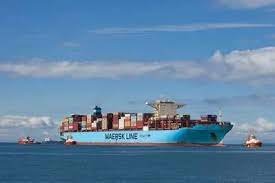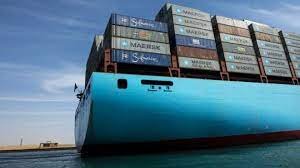
In a strategic maneuver to counter persistent security challenges, Maersk, a cornerstone in the expansive global shipping industry, has formally announced its intention to recommence shipping operations in the Red Sea and Gulf of Aden. This decision comes on the heels of a temporary suspension provoked by escalating security concerns attributed to attacks by Iran-backed Houthi forces. The impending resumption is not a mere logistical pivot for Maersk; rather, it stands as a significant development with profound implications for maritime security and the intricate web of global trade.
Understanding the Complex Security Landscape:
Set against the backdrop of heightened tensions and security risks in the Red Sea region, Maersk’s decision to temporarily cease operations emphasized the gravity of security challenges faced by vessels navigating these critical waterways. The region has become a crucible for geopolitical tensions and military confrontations, fostering an environment of uncertainty that permeates maritime activities.
The Suspension’s Ripple Effects:
Maersk’s decision to halt shipping activities in the Red Sea sent shockwaves across the maritime industry. Trade routes were disrupted, and stakeholders grappled with the far-reaching repercussions of interrupted supply chains. The decision to temporarily suspend operations was a testament to the company’s commitment to prioritizing safety and security in the face of evolving threats.
Operation Prosperity Guardian:

A Multinational Security Initiative: At the heart of Maersk’s decision to resume shipping lies the implementation of Operation Prosperity Guardian. This multinational security initiative, spearheaded by the United States, seeks to fortify maritime security in the Red Sea and Gulf of Aden. The collaborative effort involves a coalition of nations working in harmony to ensure the secure passage of vessels through these crucial waterways.
Positive Implications for Global Trade:
The revival of Maersk’s shipping activities holds the promise of far-reaching positive implications for global trade. The Red Sea functions as a vital maritime corridor, interlinking major trade routes between Europe, Asia, and Africa. Any disruption in this region can send shockwaves through the global economy, making Maersk’s decision a beacon of hope for businesses and nations reliant on seamless shipping routes.
Maersk’s Role as a Global Shipping Leader:
Positioned as a key player in the international shipping arena, Maersk’s ability to navigate through intricate geopolitical challenges underscores its significance in facilitating global trade. The company’s decision to resume operations demonstrates not only its adaptability but also its unwavering commitment to upholding a reliable and secure shipping network.
Collaborative Security Measures:
The resumption of Maersk’s shipping activities also illuminates the importance of collaborative security measures in addressing challenges faced by the maritime industry. Operation Prosperity Guardian exemplifies the potency of nations uniting to safeguard vital shipping lanes, accentuating that security is a shared responsibility.
Impact on Regional Stability: Beyond its global trade ramifications, Maersk’s decision contributes to the overall stability of the Red Sea region. By signaling a commitment to secure maritime activities, the company becomes a pivotal participant in fostering stability in an area marred by geopolitical tensions.
Rebuilding Confidence in the Maritime Industry:
The decision to resume operations in the Red Sea marks a watershed moment in rebuilding confidence within the maritime industry. Stakeholders, encompassing shipping companies, traders, and governments, can view this as a positive step towards restoring normalcy and predictability in maritime operations.
The Road Ahead:
While Maersk’s decision to resume shipping in the Red Sea marks a significant leap forward, ongoing monitoring and collaboration will be pivotal for the sustained security of maritime activities in the region. Continued efforts under initiatives like Operation Prosperity Guardian will be essential to effectively address evolving security threats.

Maersk’s proclamation to resume shipping in the Red Sea signifies a breakthrough in maritime security endeavors. The decision mirrors not only the resilience of a major player in the shipping industry but also the success of collaborative initiatives aimed at enhancing security in critical waterways. As global trade hinges on reliable shipping routes, Maersk’s move serves as a positive signal for businesses and economies worldwide, emphasizing the importance of ongoing efforts to fortify maritime security and ensure the unimpeded flow of goods through one of the world’s most crucial trade routes.










